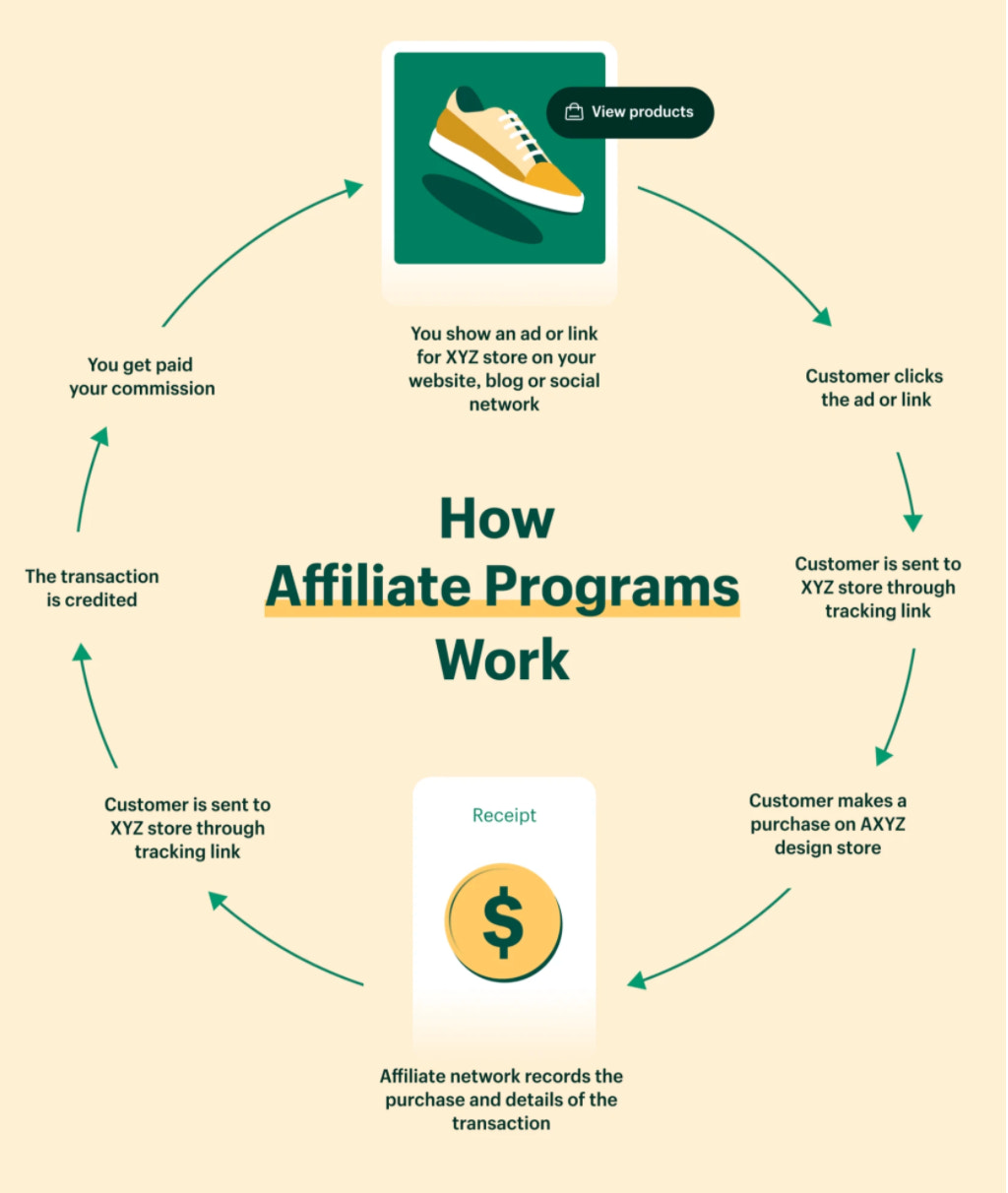Learn the basics of Affiliate Marketing in this ultimate guide for beginners. Discover how to earn passive income, choose niches, and promote products.
Are you eager to learn about Affiliate Marketing? Look no further! This article serves as your ultimate introduction to this exciting field. Whether you’re a beginner who has never heard of affiliate marketing or someone who has just started exploring it, this article has got you covered.
From understanding the basics to discovering the potential benefits, you’ll gain valuable insights into this lucrative industry. So, get ready to learn the essentials of affiliate marketing in a friendly and accessible way.

What is Affiliate Marketing?
Affiliate marketing is a popular online business model that allows individuals to earn commissions by promoting and selling other people’s products or services. It is a performance-based marketing strategy where affiliates are rewarded for each sale, lead, or click generated through their marketing efforts.
Definition of affiliate marketing
Affiliate marketing can be defined as a partnership between a merchant and an affiliate where the affiliate promotes the merchant’s products or services and earns a commission for any resulting sales, leads, or clicks.
How does affiliate marketing work
The process of affiliate marketing involves four key participants: the merchant, the affiliate, the customer, and the affiliate network. The merchant is the person or company that owns the product or service being promoted, and they provide the affiliate with unique tracking links. The affiliate promotes these products or services through various marketing channels, such as websites, blogs, social media, or email marketing. When a customer clicks on the affiliate’s tracking link and completes a desired action, such as making a purchase or submitting their contact information, the affiliate earns a commission. The affiliate network acts as an intermediary between the merchant and affiliate, ensuring proper tracking and commission payments.
Examples of affiliate marketing
There are countless examples of successful affiliate marketing programs across various industries. For instance, Amazon Associates is one of the most well-known affiliate programs, allowing affiliates to earn commissions by promoting products from Amazon’s vast inventory. Another example is the travel industry, where websites specializing in hotel bookings or flight comparisons often have affiliate partnerships with major travel agencies. Additionally, bloggers often affiliate with companies in their niche to promote relevant products or services to their audience.
Benefits of Affiliate Marketing
Affiliate marketing offers several benefits that make it an attractive option for individuals looking to earn income online.
Passive income potential
One of the primary benefits of affiliate marketing is the potential for passive income. Once you have set up your affiliate marketing campaigns and have established a steady stream of traffic to your promotions, you can continue to earn commissions even while you sleep. This means that with the right strategies, you can generate income without actively trading your time for money.
No need for product creation
Unlike traditional businesses where you need to create and develop your own products, affiliate marketing allows you to leverage existing products or services. You don’t have to worry about inventory management, product development, or customer support. Your role as an affiliate marketer is to promote and drive traffic to the merchant’s products, leaving the rest of the process to the merchant.
Low startup costs
Starting an affiliate marketing business requires minimal investment compared to other business models. You don’t need to purchase inventory or invest in expensive equipment. The primary costs associated with affiliate marketing include setting up a website or blog, marketing and promotion expenses, and potentially investing in certain tools or software to enhance your campaigns. Overall, the low startup costs make affiliate marketing an accessible option for beginners.
Flexibility and scalability
Affiliate marketing offers a high level of flexibility and scalability. You have the freedom to work from anywhere at any time, as long as you have access to a computer and the internet. Additionally, once you have gained experience and built a successful affiliate marketing business, you can scale your efforts by expanding into new niches, promoting additional products, or even hiring a team to assist with your marketing efforts.

How to Get Started with Affiliate Marketing
Getting started with affiliate marketing involves several key steps to set yourself up for success.
Choosing a niche
The first step in affiliate marketing is to choose a niche or a specific area of interest. This will help you focus your efforts and target a specific audience. Consider your own interests, expertise, and the potential profitability of the niche. It’s important to choose a niche that you are passionate about and that has enough demand to generate sufficient income.
Researching and selecting affiliate programs
Once you have chosen your niche, research and select affiliate programs that align with your chosen niche. Look for programs that offer products or services that are relevant and valuable to your audience. Consider factors such as commission rates, cookie duration, and the reputation and reliability of the program. You can find affiliate programs through affiliate networks, individual companies’ websites, or through a quick search engine query.
Building a website or blog
A website or blog serves as your online platform to showcase your affiliate promotions and provide valuable content to your audience. Choose a domain name that reflects your niche and set up a hosting account. Build your website or blog using a user-friendly platform or content management system. Customize the design to match your branding and ensure it is visually appealing and easy to navigate.
Creating quality content
Quality content is the backbone of successful affiliate marketing. Create valuable and informative content that engages your audience, answers their questions, and addresses their pain points. Incorporate your affiliate promotions naturally within your content, ensuring that they align with your audience’s needs and preferences. Remember to use persuasive language and compelling calls-to-action to encourage your audience to take action.
Promoting affiliate products
Promotion is a critical aspect of affiliate marketing. Explore various promotional channels such as social media, email marketing, content marketing, and paid advertising to drive traffic to your affiliate promotions. Utilize SEO strategies to improve your website’s visibility in search engine results and leverage social media platforms to engage with your audience and share relevant content. Continuously test and optimize your promotional efforts to maximize your conversions and earnings.
Understanding Affiliate Networks
Affiliate networks play an important role in the affiliate marketing ecosystem, serving as intermediaries between affiliates and merchants.
What are affiliate networks?
Affiliate networks are platforms that connect affiliates and merchants, facilitating the tracking and management of affiliate marketing partnerships. They provide a centralized platform where affiliates can find and join multiple affiliate programs, and where merchants can recruit and manage affiliates. These networks handle tasks such as tracking transactions, ensuring proper commission payments, and providing reporting and analytics for both affiliates and merchants.
How do affiliate networks work?
Affiliate networks work by acting as a middleman between affiliates and merchants. Affiliates join the network and gain access to a wide range of affiliate programs offered by various merchants. They can browse through the available programs, apply to join them, and receive unique tracking links to promote the merchant’s products or services. When a sale, lead, or click is generated through the affiliate’s efforts, the affiliate network tracks the transaction and ensures that the affiliate receives the appropriate commission.
Popular affiliate networks
There are numerous affiliate networks available, each with its own set of features, commission structures, and niches. Some popular affiliate networks include Amazon Associates, Commission Junction, ShareASale, and ClickBank. It is important to research and choose an affiliate network that aligns with your niche and offers reputable and reliable merchants.

Different Types of Affiliate Marketing
Affiliate marketing encompasses various models and approaches. Understanding the different types of affiliate marketing can help you choose the best strategies for your business.
Pay-per-click (PPC) affiliate marketing
In pay-per-click affiliate marketing, affiliates earn a commission every time a visitor clicks on their affiliate link, regardless of whether a sale or lead is generated. This model is commonly used in contexts where traffic is the primary goal, such as advertising platforms or content-rich websites.
Pay-per-lead (PPL) affiliate marketing
Pay-per-lead affiliate marketing involves affiliates earning a commission for every lead they refer to the merchant. A lead refers to a potential customer who has provided their contact information or taken a specific action, such as signing up for a newsletter or completing a form. This model is often used in industries where capturing leads is valuable, such as insurance or financial services.
Pay-per-sale (PPS) affiliate marketing
Pay-per-sale affiliate marketing is perhaps the most common model, where affiliates earn a commission for every sale they generate through their promotional efforts. This model incentivizes affiliates to focus on driving conversions and can be highly profitable when targeting high-value products or services.
Multi-tier affiliate marketing
Multi-tier affiliate marketing involves affiliates earning commissions not only from their own sales or leads but also from the sales or leads generated by affiliates they have referred to the program. This model allows for greater earning potential and encourages affiliates to recruit and support others in their marketing efforts.
Tips for Successful Affiliate Marketing
To succeed in affiliate marketing, consider implementing the following tips and strategies.
Choose products/services you use and believe in
Promoting products or services that you personally use and believe in is key to building trust with your audience. Authentic recommendations and honest reviews will resonate with your audience and increase the likelihood of conversions.
Build trust with your audience
Trust is crucial in affiliate marketing. Focus on building relationships with your audience by consistently providing value, being transparent about your affiliate relationships, and addressing any concerns or questions they may have. Engage with your audience through comments, emails, or social media to create a sense of community and establish yourself as a knowledgeable and trustworthy affiliate.
Focus on providing value
Successful affiliate marketers prioritize providing value to their audience. Create content that educates, entertains, or solves problems for your audience. By offering valuable information and resources, you will attract and retain a loyal following who will be more likely to trust your recommendations and make purchases through your affiliate links.
Track and analyze your efforts
Monitoring and analyzing the performance of your affiliate marketing campaigns is crucial for identifying what works and what doesn’t. Utilize tracking tools and analytics to measure your conversions, click-through rates, and other performance metrics. Use this data to optimize your strategies, improve your conversions, and maximize your earnings.
Stay updated with industry trends
Affiliate marketing is constantly evolving. Stay informed about the latest industry trends, techniques, and best practices to stay ahead of the competition. Attend industry conferences, join affiliate marketing communities, and subscribe to relevant newsletters or podcasts to stay up to date and continue learning and growing in your affiliate marketing journey.
Common Affiliate Marketing Mistakes to Avoid
To ensure success in affiliate marketing, it is essential to avoid common pitfalls and mistakes that could hinder your progress.
Promoting too many products/services
Promoting too many products or services can dilute your message and confuse your audience. It is better to focus on a few high-quality, relevant products or services that truly resonate with your audience rather than trying to promote everything. Quality over quantity is key.
Neglecting proper disclosure
Transparency is crucial in affiliate marketing. Always disclose your affiliate relationships and make it clear to your audience that you may earn a commission if they make a purchase through your links. Neglecting proper disclosure can lead to distrust and may even violate legal guidelines.
Ignoring SEO and keyword research
Search engine optimization (SEO) plays a significant role in driving organic traffic to your affiliate promotions. Ignoring SEO and keyword research can limit your visibility and hinder your success. Invest time in optimizing your website, content, and promotional efforts for search engines to increase your chances of attracting targeted traffic.
Promoting unethical products
Promoting unethical products or engaging in deceptive marketing practices can seriously damage your reputation and credibility. Prioritize promoting products or services that align with your values and adhere to ethical business practices. Always consider the impact of your affiliations on your brand and audience trust.
Affiliate Marketing Tools and Resources
To streamline your affiliate marketing efforts, consider utilizing various tools and resources available in the market.
Affiliate tracking software
Affiliate tracking software helps you track and manage your affiliate marketing campaigns. It provides real-time data on clicks, conversions, and earnings, allowing you to monitor and optimize your performance. Popular affiliate tracking software includes platforms like AffiliateWP, Post Affiliate Pro, and Refersion.
SEO tools
SEO tools help you optimize your website and content for search engines, improving your organic traffic and visibility. Tools like SEMrush, Moz, and Ahrefs provide insights into keyword research, competitor analysis, and website optimization techniques.
Email marketing services
Email marketing is a powerful tool for affiliate marketers to nurture relationships with their audience and promote affiliate products. Services like Mailchimp, ConvertKit, and GetResponse offer features such as email automation, segmentation, and analytics to help you effectively manage your email marketing campaigns.
Social media platforms
Social media platforms like Facebook, Instagram, and Twitter serve as valuable channels for promoting your affiliate products and engaging with your audience. Utilize social media management tools such as Hootsuite, Buffer, or Sprout Social to schedule and track your social media posts, and to analyze their performance.

Legal and Ethical Considerations in Affiliate Marketing
When engaging in affiliate marketing, it is important to understand and comply with legal and ethical guidelines to protect yourself, your audience, and your business.
Understanding FTC guidelines
The Federal Trade Commission (FTC) in the United States requires affiliates to disclose their relationships with merchants and disclose any financial incentives or commissions they may receive for endorsements. Familiarize yourself with the FTC guidelines and ensure you comply with their requirements regarding proper disclosures.
Disclosing affiliate relationships
Transparently disclosing your affiliate relationships is crucial to maintaining trust with your audience. Clearly state that you may earn a commission if they make a purchase through your links. There are various ways to disclose, such as using disclosure banners or including disclaimers within your content.
Avoiding deceptive marketing practices
Deceptive marketing practices can tarnish your reputation and have legal consequences. Avoid engaging in misleading or false advertising, making exaggerated claims, or deceiving your audience. Focus on providing accurate and truthful information to build long-term trust with your audience.
Conclusion
Affiliate marketing offers an accessible and potentially lucrative opportunity to earn income online. By understanding the fundamentals of affiliate marketing, leveraging the right strategies, and staying ethical and compliant, you can build a successful affiliate marketing business. Remember to choose a niche, research and select affiliate programs, create valuable content, promote your affiliate products, and continuously analyze and optimize your efforts. With dedication, perseverance, and a focus on providing value, you can achieve success in the dynamic world of affiliate marketing.

